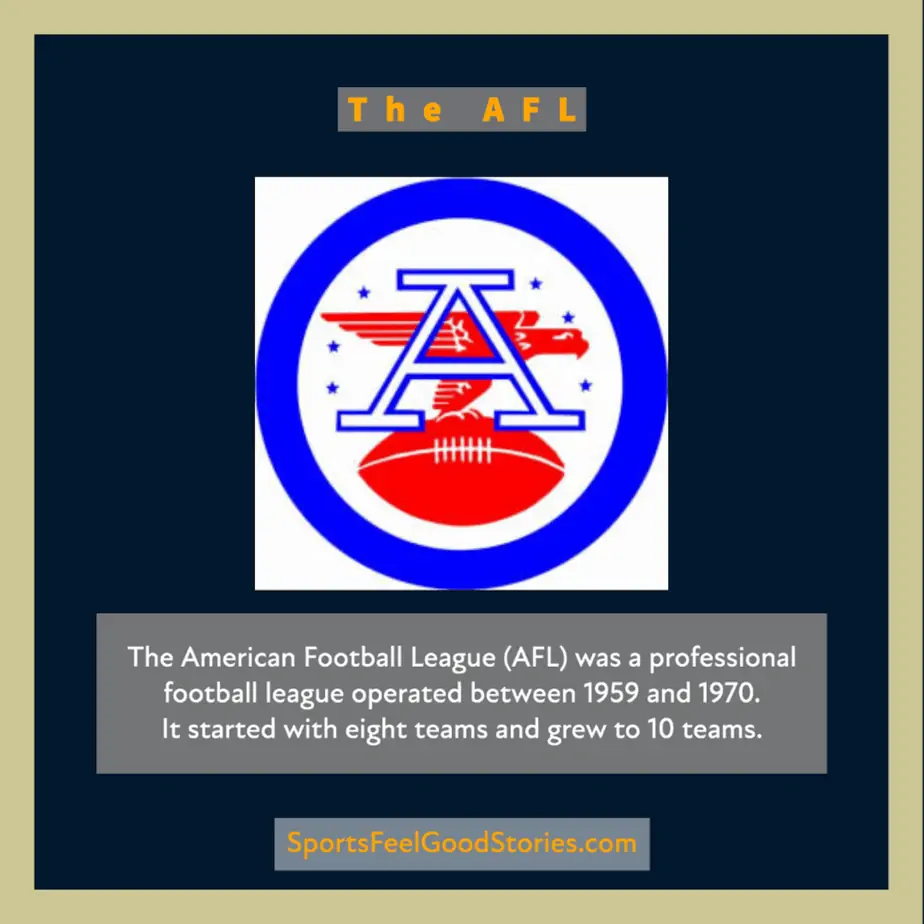If there were no AFL, there’d be no Super Bowl. When the winner of the NFL played the winner of the AFL, the Super Bowl was born. But, this wasn’t the only innovation of the American Football League (AFL).
The legacy of the AFL’s contribution to football and American sports centers on two key points. It was really the first professional football league to have considerable success competing against the NFL. Previous attempts for professional football teams outside of the NFL had faded away with little success.
And, perhaps its most lasting legacy of the league, is that the AFL advanced the integration of African-American football players into professional football to a much greater degree than the older NFL.
Some of the AFL teams, particularly the Kansas City Chiefs, recruited players from Historic Black Colleges and Universities (HBCUs). The Chiefs 1969-1970 Super Bowl-winning team roster has 13 players from HBCUs, including standouts like Buck Buchanan, Otis Taylor, Willie Lanier, and Emmitt Thomas. The Chiefs’ opponent in Super Bowl IV, the Minnesota Vikings of the old NFL, had zero players from HBCUs.
What was the AFL?
The American Football League (AFL) was a professional football league operated between 1959 and 1970. The league started with eight teams and grew to 10 teams by their final season.
Key Takeaways
Lamar Hunt spearheaded the creation of the AFL after he attempted to bring an NFL team to Dallas failed.
The AFL operated for ten seasons between 1960 and 1969. The league was split up into two divisions: an Eastern Division and a Western Division.
The league began to merge with the NFL in 1966, and one of the by-products: the Super Bowl!
The 1960s version of the AFL was the most successful competitor to the NFL after four other leagues failed between 1926 and 1949.
The AFL was a pioneer in drafting African-American players from Historic Black Colleges and Universities and advancing the integration of professional football.

Creation of the AFL
Lamar Hunt was certain to bring professional football to his hometown of Dallas. When Hunt’s negotiations with the NFL never came to fruition, he decided to team up with several business colleagues and created the AFL to rival the NFL.
Who were the original AFL teams?
The AFL’s original teams were:
Boston Patriots
Buffalo Bills
Houston Oilers
New York Titans
Los Angeles Chargers (moved to San Diego)
Denver Broncos
Oakland Raiders
Dallas Texans (moved to Kansas City and became the Chiefs)
AFL’s Eastern Division was made up of what is known today as the AFC South and the Houston Oilers. These teams included the Boston Patriots, Buffalo Patriots, Miami Dolphins (joined in 1966), and New York Titans/Jets. The Western Division was composed of what is known today as the AFC West and the Cincinnati Bengals. These teams included the Dallas Texans/Kansas City Chiefs, Denver Broncos, Los Angeles/San Diego Rams, and Oakland Raiders.
Which team won the most AFL Championships?
The Dallas Texans/Kansas City Chiefs owned by Lamar Hunt won three AFL Championships surpassing the Houston Oilers and Buffalo Bills who each won two.
What other innovations did the AFL contribute to professional football?
Here are some of the AFL’s contributions to the game of football:
The AFL’s success was largely due to the success of black players from historically black colleges. KC Chiefs’ owner Lamar Hunt was to professional football what Branch Rickey was to Major League Baseball. The Chiefs hired the first dedicated scout for HBCUs, among other advancements.
The newer AFL cultivated a flashier image that mirrors today’s NFL more so than the old NFL. Players’ names were added to the back of jerseys. Some players like Joe Namath wore white shoes. The AFL had more personality and pizzazz.
The offenses of the AFL are more like today’s modern pass offenses. The Oakland Raiders loved the long pass to such an extent that their QB, Daryl Lamonica, was nicknamed the “Mad Bomber.” Sid Gillman, coach of the AFL’s Chargers franchise in the early 1960s, liked to stretch defenses by throwing long passes downfield. If you’re interested in learning more about Gillman, do a Google search on his coaching tree. It includes Al Davis, Chuck Noll, Chuck Knox, Don Coryell, and many other successful coaches.
The Super Bowl came about as a direct result of the AFL/NFL merger. Even the name “Super Bowl” was coined by AFL founder Lamar Hunt.
The merger of the AFL/NFL helped move professional football to the number one sport in America, replacing baseball.
AFL-NFL Merger
The AFL and NFL reached an agreement in 1966 to merge the two leagues. The new league would keep the NFL name and began to play as one league in 1970. Until the two leagues united, the winners of both leagues played each other in a championship game now referred to as the ‘Super Bowl.’ NFL’s Green Bay Packers won the first two Super Bowls with wins over Kansas City and Oakland, but the AFL got their first Super Bowl win when the New York Jets defeated the Baltimore Ravens to win Super Bowl III.
What the American Football League is NOT
The American Football League is the AFL, which has proven to be a common abbreviation for sports leagues over the years. The AFL is used to refer to the old AFL leagues before the 1960s and the Australian Football League and the Arena Football League, which folded in 2019 after a 33-year run.
FAQs on the AFL
Here are some frequently asked questions about the AFL.
What is the difference between AFL and NFL?
The AFL ran as a league for a decade in the 1960s. The NFL is still currently running and thriving. The AFL, the biggest competitor to the NFL, agreed to merge with the NFL in 1966. Now more than a century old, the NFL is the biggest sports league in the world and generated more than $15 billion in 2019.
What were the effects of the AFL-NFL merger?
As the NFL continued its growth, the emergence of the AFL stole much of its thunder and caused much bickering between the two leagues. When the two leagues worked things out and merged, they quickly overtook MLB to become the nation’s most-watched sport. Of course, the creation of the Super Bowl is among the most impressive outcomes now that it has become among the most coveted trophies in all sports.
What AFL franchise had the most success?
The Dallas/Kansas City franchise had the most success. That franchise’s first AFL Championship win came as the Dallas Texans in 1962 with a double-overtime win against Houston. Upon relocating to become the Kansas City Chiefs, the organization added two more AFL Championships in 1966 and 1970. The Houston Oilers and Buffalo Bills were the other most successful teams with two AFL Championships each, followed by the New York Jets with one.
Does the AFL still exist?
The AFL no longer exists as one league. However, they still do exist to an extent. All ten teams are still playing in the NFL. All ten teams are a part of the American Football Conference (AFC), with six other teams who compete against the National Football Conference (NFC). The AFC East and AFC West still have their four-team divisions intact while Houston joined the AFC South and Cincinnati is in the AFC North.

You’re on our American Football League (AFL) page.
You might like:
